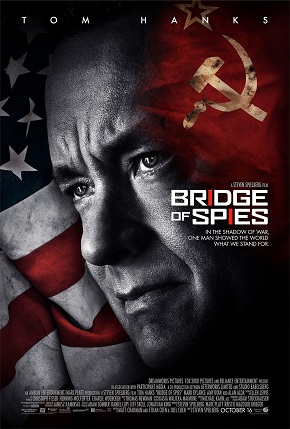Review: ‘Bridge of Spies’

“Bridge of Spies,” Steven Spielberg’s 2015 political drama set during the Cold War, shows Spielberg’s more humanistic side. In other words, it’s a lot more like “Lincoln” than “Jurassic Park.” The cast is lead by prominent leading man Tom Hanks, who delivers a meditative, thought-provoking performance to match the reflective mood set by Spielberg.
Despite its lack of CGI and creatures with too many teeth, Bridge of Spies packs a strong message that perhaps in the era it was set in would never have made it to the big screen. The Cold War was a troubling time in the U.S.’s history. It was a time of high tension, high stakes and high suspicions. After every tube in the family living room had broadcast the horrors a powerful European country had wreaked upon the home of the brave, people clung to the polished shoes of our government. This blind devotion and hatred could not be more clearly depicted in Bridge of Spies.
The story opens with the arrest of Rudolf Abel on suspicion of espionage. Right away, the film leaves no room for doubt of his guilt. That’s where James B. Donovan (Tom Hanks), New York City insurance lawyer, comes in. Donavan is cast for the role of concerned lawyer, hired to show the Reds that we civilized Americans will give anyone a fair trial, but the other lawyers at Donovan’s firm and even the judge himself are candor in saying that they expect Abel to be in the electric chair within the year.
However, Donovan won’t stand for that.
“Everyone deserves a defense. Every person matters,” Donovan insists.
Thus, the battle of morals begins.
Donovan insists on giving Abel a fair trial and if all else fails keeping Abel alive, just to be safe. The case is shuffled from court to court, judge to judge. It makes headlines and the nightly news. Donovan jokes that he is the most hated man in America.
Though Abel is from behind enemy lines, Spielberg invites us to explore where those lines are drawn, and does so by taking us to the other side of the looking glass. Francis Gary Powers is a newly christened Air Force pilot, his first mission is to fly into the war zone to take pictures of enemy ground. Oh so similar to Abel, Powers is quickly brought down and held as an enemy of the Soviets.
The plight of both captives and their captives are shown side by side, revealing that perhaps they aren’t that different from each other.
The enemy, it seems, all depends on where you’re standing. And stand Donovan does, against the CIA, Russian soldiers, East German lawyers and court after court of grim faced judges, fighting to find a way to bring both soldiers home.
Donovan represents an ideal of government that everyone wanted to believe existed during the frigid and gray years of the Cold War, but an unapologetically harsh light is thrown on the government that actually was, a government that was also afraid.
Spielberg is brutally honest about the effect fear has on people. It makes them harsh, uncompassionate, self and above all cold.
I recently read an article about the publication of the highly controversial book, “Go Set a Watchman,” the supposed first draft of the famed “To Kill a Mockingbird.” “To Kill a Mockingbird” was published in 1960, around the same time this war swept our nation. The controversy is due to the characterization of Atticus Finch as a racist, bitter old man. Readers of To Kill a Mockingbird knew Atticus as a mild-mannered lawyer, who fought for the justice of Tom Robinson, a man people didn’t think deserved a defense because of his race. It may be the literary nerd in me, but I’d like to think that all those years ago when Harper Lee was still revising that first draft a headline about this old fashioned lawyer who dared to fight against stereotypes somehow crossed her path.
Bridge of Spies surprises with its authenticity. I thoroughly enjoyed how though it was a political drama, the drama tried to focus more on the characters in the story than the political parties and governments they represented. At its heart, Bride of Spies isn’t about the warring political sides but the humans caught in the middle, a perspective most war movies don’t take the time to explore. You can’t help but like the main characters either, even the convicted spy. Although this was a grim time in history the set, with its rainy brick streets and old townhouses, combined with a cast in three piece suits and knee length dresses, gives the movie a charming, old timey feel.
On the other hand, viewers will want to run to the bathroom before the opening credits, because this film runs a whooping two hours and 21 minutes, and it’s one of those movies where if you blink, you’ve missed the introduction of five new characters and the climax. There are a few places where the plot starts to drag, but Spielberg paces it well enough so that when you sense the film starting to sag it finds a way to take off again.
All in all, I give Bridge of Spies a nine out of 10. It’s bold, it’s intense, it’s blisteringly intelligent, and it’s well worth the $8 to get in.

Senior Julia Zaksek enjoys iced coffee, long cardigans, realistic fiction and the company of her fellow editors. She plans on attending the University...




